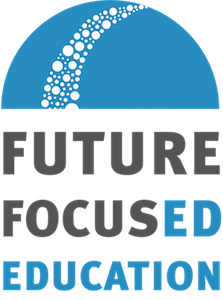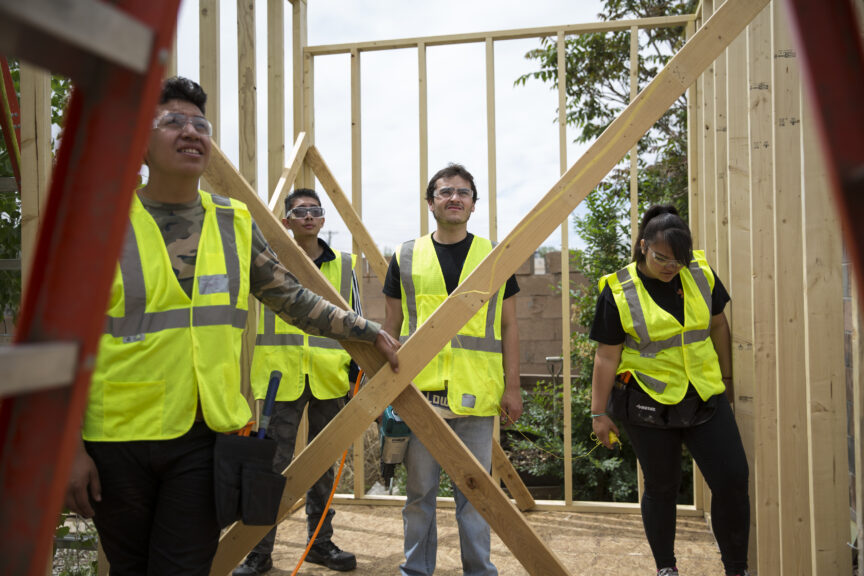Innovation in New Mexico: ACE Leadership High School
By Laurie Gagnon, CompetencyWorks Program Director, Aurora Institute
This is the third in a three part series that Laurie Gagnon has written about Innovation in New Mexico after recent visits to the state. The first is here and the second is here. The original series, which has five parts and is more detailed, can be found here.
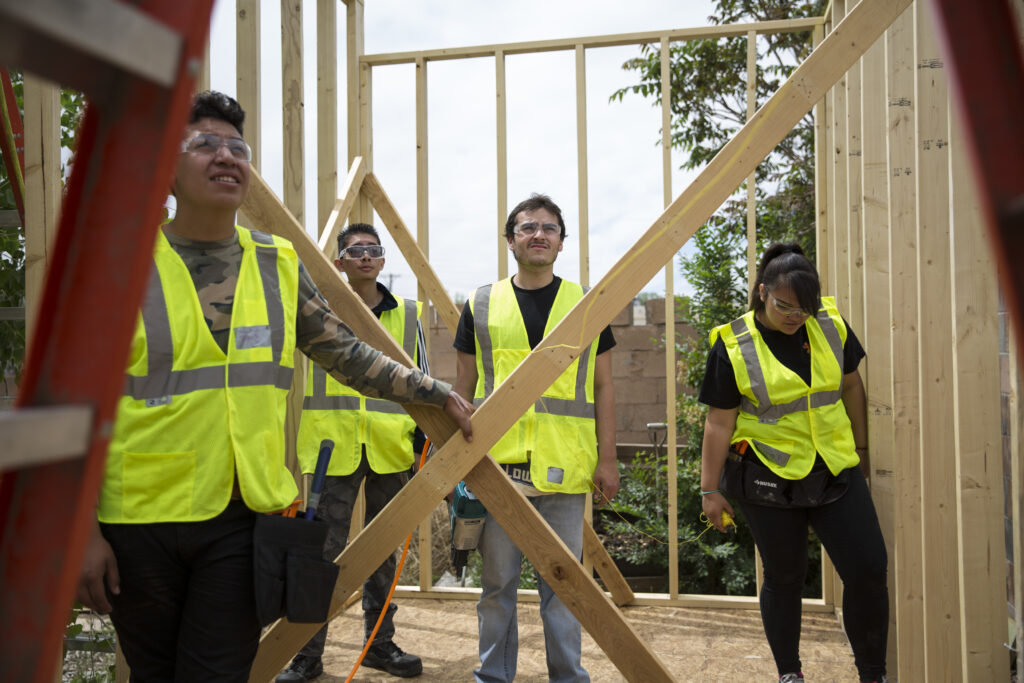
Redefining Education Through Project-Based and Work-Based Learning
ACE Leadership High School, located in Albuquerque, New Mexico, has redefined what education can look like. Established in 2010, ACE’s mission has always been to provide an innovative learning environment for students who have struggled in traditional high school settings. With a focus on architecture, construction, and engineering, the school offers an academic curriculum that is grounded in practical applications, ensuring students not only graduate but are prepared to join the workforce or pursue further education. ACE is a model for the field in using project-based learning (PBL) to drive a competency-based pedagogical approach.
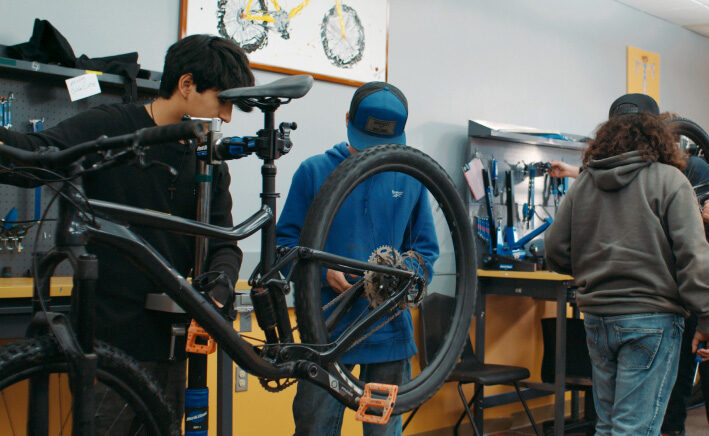
Project-Based Learning: The Foundation of ACE’s Approach
ACE operates on a competency-based education model that relies heavily on project-based learning. Students understand academic content by engaging in real-world projects such as designing architectural renderings, building roof trusses, or renovating kitchens. This method allows students to grasp core academic concepts through the lens of practical, hands-on work. For example, geometry comes to life as students create architectural plans, and math and physics are applied in designing structural components like roof trusses. On the humanities side, understanding safety regulations provides a lens into the history of industrialization and the role of government, and literacy skills are woven throughout as students communicate their ideas.
One of the school’s signature features is its collaboration with industry professionals who guide students in their learning journey. These professionals lead classes, host internships, and provide mentorship, making learning more relevant and immediately applicable. Many ACE graduates go on to join apprenticeship programs or pursue technical training at community colleges, such as the Local 412 Plumbers and Pipefitters Apprenticeship program or the Central New Mexico Community College’s Electrical Lineworkers Pre-Apprenticeship program. By linking academic content directly with career pathways, ACE ensures that students see the relevance of finishing high school and pursuing further opportunities.
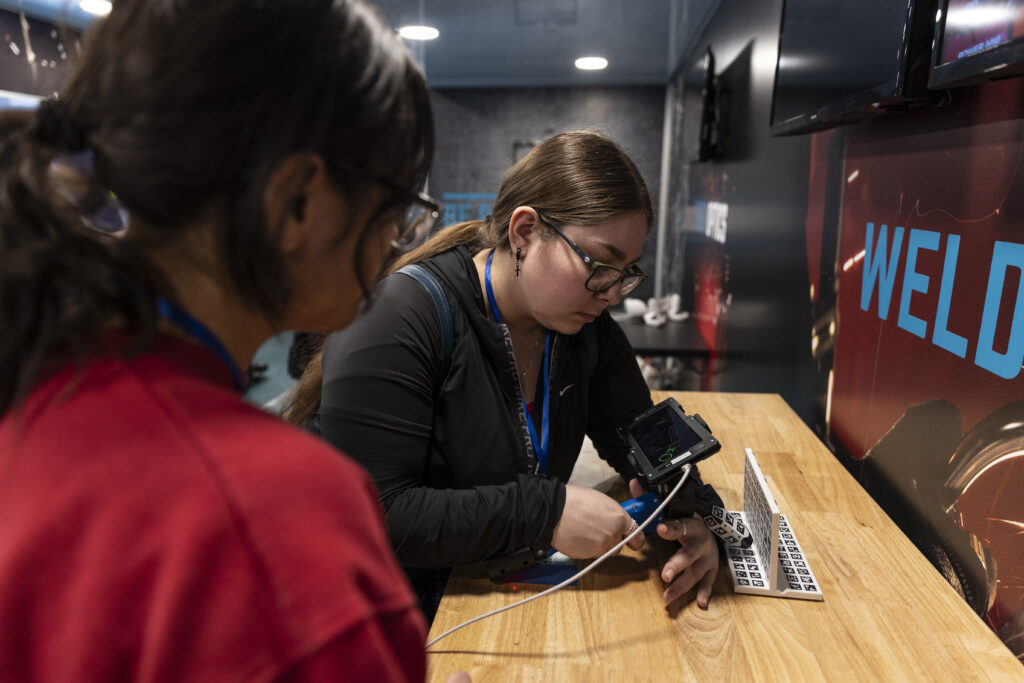
The Graduation Profile and Blueprint of Foundational Experiences

At the core of ACE’s educational design are two key documents: the Graduation Profile and the Blueprint of Foundational Experiences. The Graduation Profile outlines the skills and knowledge students should have when they graduate, while the Blueprint provides a roadmap for how these goals are achieved. These guiding frameworks ensure that every project and every lesson is aligned with real-world outcomes, equipping students with both academic knowledge and industry-relevant skills.
Students at ACE engage in two interdisciplinary projects per trimester, and each project is designed to teach both academic and technical skills. For example, one project asked students to design solutions for revitalizing abandoned buildings in Albuquerque, incorporating elements of social determinants of health and urban planning. Students not only learn about community development but also engage with critical civic and environmental issues, making learning meaningful and relevant.

Expanding Work-Based Learning Through Innovation
With the support of New Mexico’s Innovation Zone legislation, ACE expanded its work-based learning (WBL) opportunities in recent years. Many students in New Mexico leave school early to enter the workforce due to financial pressures, so ACE developed a work-based learning program to keep students engaged in school while preparing them for successful careers. This approach offers personalized pathways, allowing students to learn at their own pace through real-world experiences that align with their career goals.
In 2022, ACE made a significant leap by integrating paid internships into its curriculum for all seniors. This initiative was part of a broader strategic plan to ensure that every student graduates with both a high school diploma and hands-on work experience. Internships have been incorporated into the senior capstone course, making them a requirement for graduation. These internships, hosted by local businesses such as construction firms and automotive companies, allow students to apply their skills in real-world settings while gaining invaluable experience.
WBL at ACE is not limited to seniors. In the 2023-24 school year, ACE launched “Work-Based Learning Wednesdays” for all grade levels. On these days, students participate in workshops led by industry professionals, engage in service learning at local community organizations, or attend job-shadowing opportunities. Juniors, for example, may spend Wednesdays gaining experience in community service or shadowing professionals, while seniors are working on their internships. This approach ensures that students build work-related skills incrementally throughout their high school career.
Microcredentials and Certifications: Skills That Matter
In addition to internships, ACE students can earn microcredentials for industry-specific skills such as Hand Tool Safety, Blueprint Reading, and Photovoltaic Science. These microcredentials, assessed through performance-based tasks, provide students with tangible proof of their skills, which they can present to potential employers. Students also have the opportunity to earn formal certifications, such as OSHA safety credentials or CPR/First Aid certifications, further increasing their employability upon graduation.
ACE's commitment to blending academic learning with hands-on experience has proven successful. By the end of the 2023 school year, 37% of students were participating in paid WBL opportunities, and that number continues to grow as the school refines its approach and secures additional partnerships.
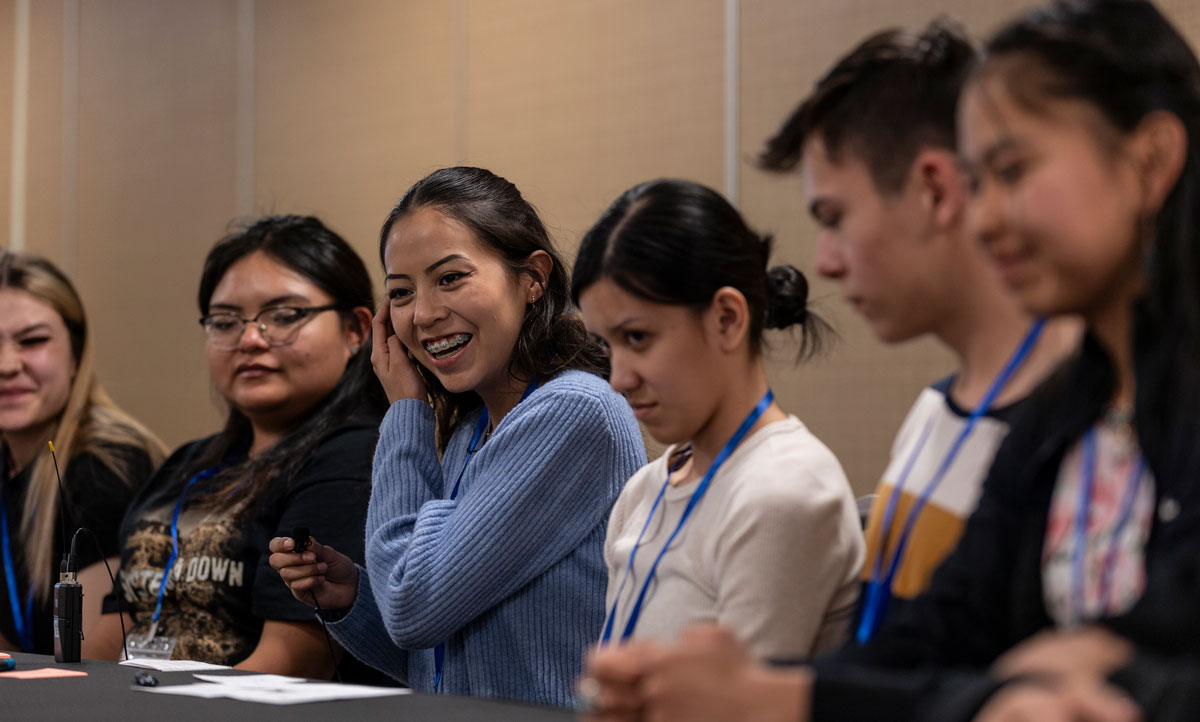
Engaging Students Through Community Exhibitions
One of the highlights of ACE’s project-based approach is the Exhibition Days, where students showcase their projects to the community, including industry leaders and local professionals. These events allow students to present their work, practice public speaking, and receive feedback from experts in the field. The projects are not just for academic credit; they serve as practical assessments where students demonstrate their learning and skills in front of a real audience.
For example, one group of students recently presented a redesign of prison facilities aimed at reducing recidivism, while another group showcased wind turbine models they had developed for a renewable energy competition. These exhibitions highlight the depth and breadth of learning at ACE, showing how students can tackle complex, real-world issues through the skills they’ve gained at school.
A Future-Ready Model
ACE Leadership High School’s combination of project-based and work-based learning offers a compelling model for other schools aiming to personalize learning and make education more relevant. The school’s ability to seamlessly integrate academic content with hands-on experiences and real-world skills sets its students on a path to success, whether they choose to enter the workforce immediately or pursue further education.
By offering internships, microcredentials, and a comprehensive project-based curriculum, ACE ensures that students leave high school not just with a diploma but with a portfolio of experiences, skills, and certifications that make them competitive in the job market. ACE’s unique model proves that it’s possible to create an education system where learning is both engaging and directly tied to real-world outcomes, making it a model worth studying and replicating across New Mexico and beyond.
The Aurora Institute works to advance student-centered, innovative K-12 education systems toward equitable and just outcomes for all. For more information about their work, visit their website. Sign up for Aurora Institute’s email updates here.

learn more:
- Portrait of a Graduate: A Gateway to Competency-Based Learning
- More States Are Creating a ‘Portrait of a Graduate.’ Here’s Why
- Profile of a Graduate to Redefine Student Success for the Future
- How to Make Senior Capstones Truly Anti-Racist: Alternative Assessments Are Not Inherently Equitable Without Concerted Effort
- Framing Habits of Work and Capstone Skills in Northern Cass
- The Culmination of Mastery and Community: Senior Exhibitions at the Parker School
- Health Leadership High School: A Case Study in Innovation

